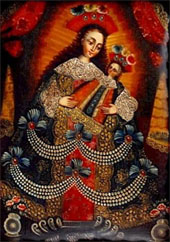
this symposium is open to the public. however, please note that the papers for this symposium will be pre-circulated to presenters, participants, and attendees. if you wish to receive the papers, please register at reltrans@princeton.edu.
*** Please not that the conference will be held at The McNeil Center for Early American Studies on Friday, November 11, 2011 and on the campus of Princeton University on Saturday, November 12, 2011. ***
Religion has long been central to how people have understood the origin and development of the Americas. Yet despite advances in comparative and transnational approaches, disciplines and fields still perpetuate a notion of the hegemonic imposition of Christianity (Protestant vs. Catholic) along linguistic and national boundaries (Iberian vs. Anglo-Saxon). We believe that this fosters a historical division that limits the extent to which we can collectively advance the study of religion in the Americas during the early modern period (1500 – 1800). One consequence of this traditional disciplinary perspective is the perpetuation of a myth about Latin America’s grand narrative of tragedy and the black legend versus North America’s history of manifest destiny and modernity. The aim of this symposium is to challenge this disciplinary and cross-cultural inaccuracy by bringing together a group of international scholars whose work will show the religious history of the Americas to be more fluid and dynamic than previously imagined.
While Catholics and Protestants formed their respective doctrines and theologies in opposition to each other throughout the early modern period, French, English, and Spanish religious enterprises in the New World were in many respects parallel endeavors. Each linked religious ideas and legal government to the organization and maintenance of a colonial community that also sought to extend its boundaries through missionary projects. Each also juggled commercial initiative with the embrace of moral tradition to engage in an ongoing project of adapting and refining religiously-grounded visions of community with the experience of collective life in an unfamiliar place and among indigenous strangers, and, later on, a significant population of African slaves. Yet the communal visions that these European cultures brought to the New World also demarcated important points of contrast. English and Spanish colonialities conceptualized boundaries differently, relying on distinct ways of both drawing and policing these geographical demarcations.
This forum dovetails with the recent resurgence of interest in religion among Americanists as well as within the Humanities more generally. The visible presence of religious thought, experience, and conflict on a national and global scale has challenged the narratives of secularization so deeply ingrained in Western intellectual culture. Consequently, humanities scholars across all fields and disciplines have had to revise traditional understandings of religion as a worldview that was eventually replaced by Enlightenment modernity. Former narratives of secularization could not account for how has religion has reestablished itself as such a pivotal political force. Or, how sacred and secular epistemologies co-existed within a single political system, cultural framework, or human mind. Early modernists are uniquely positioned to script post-secular narratives of modernity that include specific historical moments of epistemic rupture or transformation. This is because the period we study (1500 – 1800) was one that consisted both of intense religious strife and of a philosophical context that engendered a purportedly secular Enlightenment in the US and a fragmentary secular-religious movement in Latin America. We believe that early modern Americanists can speak directly and powerfully to the intellectual contours of religion in American history and on a global scale. European Christianity transformed as it took hold at various locals throughout the Atlantic World and intersected with indigenous systems of belief. Moreover, even as secular ideals challenged narratives of providential design or political theology, religion maintained a stronghold throughout the Americas.

